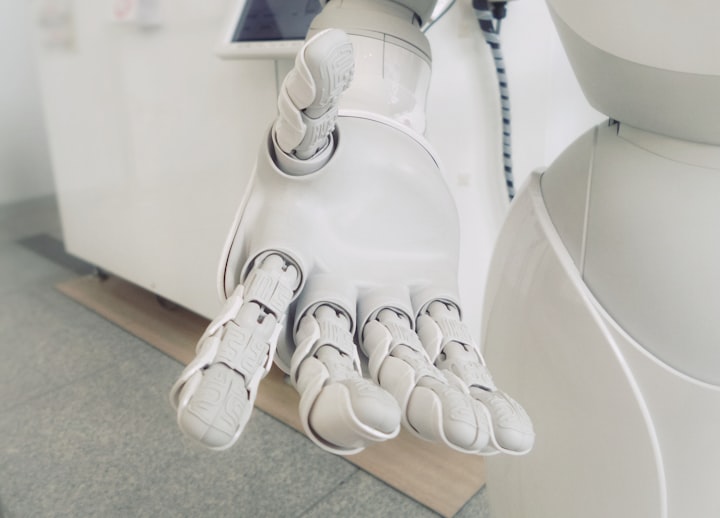How AI is Revolutionizing Industries
Artificial Intelligence

Artificial intelligence (AI) is transforming industries across the board, from healthcare and finance to retail and manufacturing. With advancements in machine learning and natural language processing, AI is revolutionizing the way we do business, improving efficiency, reducing costs, and enabling new opportunities. In this article, we'll explore how AI is revolutionizing industries and the impact it's having on the workforce.
Healthcare
AI is transforming the healthcare industry in a number of ways, from drug development to patient care. In drug development, AI is being used to analyze large amounts of data, such as clinical trial results and scientific literature, to identify new drug candidates and predict their efficacy. In patient care, AI is being used to analyze patient data, such as medical records and imaging scans, to aid in diagnosis and treatment planning. Additionally, AI-powered chatbots are being used to provide patients with 24/7 support and guidance.
Finance
In the finance industry, AI is being used to improve fraud detection and risk management, as well as to enhance customer experiences. AI algorithms are able to analyze vast amounts of data, such as transaction histories and social media activity, to identify potential fraud and mitigate risk. AI is also being used to personalize customer experiences, providing personalized product recommendations and financial advice based on individual needs and preferences.
Retail
AI is revolutionizing the retail industry by enabling personalized experiences, improving inventory management, and optimizing supply chain logistics. AI-powered chatbots are being used to provide customers with personalized recommendations and assistance, while computer vision is being used to analyze customer behavior and preferences in-store. Additionally, AI algorithms are being used to optimize inventory management, predicting demand and reducing waste. In supply chain logistics, AI is being used to improve route planning and reduce transportation costs.
Manufacturing
AI is transforming the manufacturing industry by improving efficiency, reducing downtime, and enabling predictive maintenance. Machine learning algorithms are being used to analyze sensor data and identify patterns that can predict equipment failures before they occur, enabling maintenance to be scheduled proactively. Additionally, AI is being used to optimize production processes, improving efficiency and reducing waste.
Impact on the Workforce
While AI is revolutionizing industries and enabling new opportunities, it's also having an impact on the workforce. In some cases, AI is leading to job displacement, as machines are able to perform tasks previously done by humans. However, AI is also creating new jobs, such as AI engineers and data scientists, and enabling humans to focus on tasks that require creativity and critical thinking. It's important for businesses and individuals to stay informed about the impact of AI on the workforce and to prepare for the changes that lie ahead.
In conclusion, AI is revolutionizing industries across the board, improving efficiency, reducing costs, and enabling new opportunities. From healthcare and finance to retail and manufacturing, AI is transforming the way we do business. While it's important to be aware of the potential impact on the workforce, AI is also creating new jobs and enabling humans to focus on tasks that require creativity and critical thinking. As AI continues to evolve, it will undoubtedly play a significant role in shaping the future of our world.
However, it's important to note that AI is not a silver bullet and there are still limitations and challenges to be addressed. One of the main challenges is the lack of interpretability of AI models. Many AI models are considered "black boxes" as they are unable to provide explanations for their decision-making processes. This can be a problem in industries such as healthcare and finance where transparency and accountability are crucial. Another challenge is bias in AI systems. AI algorithms are only as good as the data they are trained on, and if that data is biased, the resulting AI model will be biased as well. This can lead to discriminatory practices and perpetuate social inequalities.
Despite these challenges, AI has the potential to revolutionize industries and transform the way we live and work. It's important for businesses and individuals to stay informed about the latest developments in AI and to explore how AI can be leveraged to drive innovation and growth. In addition, it's crucial to address the ethical implications of AI and ensure that AI is developed and deployed in a responsible and accountable manner.
In conclusion, AI is revolutionizing industries across the board and enabling new opportunities for growth and innovation. From healthcare and finance to retail and manufacturing, AI is transforming the way we do business. While there are challenges and limitations to be addressed, AI has the potential to drive significant value and impact. As AI continues to evolve and become more widely adopted, it's important for businesses and individuals to stay informed and be prepared for the potential opportunities and challenges ahead.





Comments
There are no comments for this story
Be the first to respond and start the conversation.